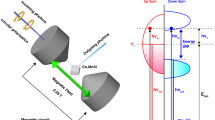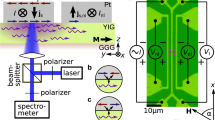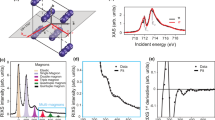Abstract
Controlling spin currents, that is, the flow of spin angular momentum, in small magnetic devices, is the principal objective of spin electronics, a main contender for future energy-efficient information technologies1,2. A pure spin current has never been measured directly because the associated electric stray fields and/or shifts in the non-equilibrium spin-dependent distribution functions are too small for conventional experimental detection methods optimized for charge transport3,4. Here we report that resonant inelastic X-ray scattering (RIXS) can bridge this gap by measuring the spin current carried by magnons—the quanta of the spin wave excitations of the magnetic order—in the presence of temperature gradients across a magnetic insulator. This is possible due to the sensitivity of the momentum- and energy-resolved RIXS intensity to minute changes in the magnon distribution under non-equilibrium conditions. We use the Boltzmann equation in the relaxation time approximation to extract transport parameters, such as the magnon lifetime at finite momentum, essential for the realization of magnon spintronics.
This is a preview of subscription content, access via your institution
Access options
Access Nature and 54 other Nature Portfolio journals
Get Nature+, our best-value online-access subscription
$32.99 / 30 days
cancel any time
Subscribe to this journal
Receive 51 print issues and online access
$199.00 per year
only $3.90 per issue
Buy this article
- Purchase on SpringerLink
- Instant access to the full article PDF.
USD 39.95
Prices may be subject to local taxes which are calculated during checkout




Similar content being viewed by others
Data availability
Data supporting the findings of this study are available upon reasonable request from the corresponding authors.
Change history
17 September 2025
In the version of the article initially published, the department names in affiliations 4 and 11 were switched and have now been corrected in the HTML and PDF versions of the article. Affiliation 4 now reads “Institute for Materials Research, Tohoku University, Sendai, Japan” and affiliation 11 now reads “WPI Advanced Institute for Materials Research, Tohoku University, Sendai, Japan”.
References
Uchida, K. et al. Observation of the spin Seebeck effect. Nature 455, 778–781 (2008).
Bauer, G. E., Saitoh, E. & Van Wees, B. J. Spin caloritronics. Nat. Mater. 11, 391–399 (2012).
Hirsch, J. Overlooked contribution to the Hall effect in ferromagnetic metals. Phys. Rev. B 60, 14787 (1999).
Saitoh, E., Ueda, M., Miyajima, H. & Tatara, G. Conversion of spin current into charge current at room temperature: inverse spin-Hall effect. Appl. Phys. Lett. 88, 182509 (2006).
Han, W., Maekawa, S. & Xie, X.-C. Spin current as a probe of quantum materials. Nat. Mater. 19, 139–152 (2020).
Gish, J. T., Lebedev, D., Song, T. W., Sangwan, V. K. & Hersam, M. C. Van der Waals opto-spintronics. Nat. Electron. 7, 336–347 (2024).
Qian, X., Zhou, J. & Chen, G. Phonon-engineered extreme thermal conductivity materials. Nat. Mater. 20, 1188–1202 (2021).
Franchini, C., Reticcioli, M., Setvin, M. & Diebold, U. Polarons in materials. Nat. Rev. Mater. 6, 560–586 (2021).
Choi, Y.-G. et al. Observation of the orbital Hall effect in a light metal Ti. Nature 619, 52–56 (2023).
Rezende, S. M. Fundamentals of Magnonics Vol. 969 (Springer, 2020).
Dyakonov, M. I. & Perel, V. I. Current-induced spin orientation of electrons in semiconductors. Phys. Lett. A 35, 459–460 (1971).
Pirro, P., Vasyuchka, V. I., Serga, A. A. & Hillebrands, B. Advances in coherent magnonics. Nat. Rev. Mater. 6, 1114–1135 (2021).
Kukreja, R. et al. X-ray detection of transient magnetic moments induced by a spin current in Cu. Phys. Rev. Lett. 115, 096601 (2015).
Li, J. et al. Direct detection of pure ac spin current by X-ray pump-probe measurements. Phys. Rev. Lett. 117, 076602 (2016).
Serga, A. A., Chumak, A. V. & Hillebrands, B. YIG magnonics. J. Phys. D Appl. Phys. 43, 264002 (2010).
Uchida, K. et al. Longitudinal spin Seebeck effect: from fundamentals to applications. J. Condens. Matter Phys. 26, 343202 (2014).
Kehlberger, A. et al. Length scale of the spin Seebeck effect. Phys. Rev. Lett. 115, 096602 (2015).
Guo, E.-J. et al. Influence of thickness and interface on the low-temperature enhancement of the spin Seebeck effect in YIG films. Phys. Rev. X 6, 031012 (2016).
Ament, L. J. P., van Veenendaal, M., Devereaux, T. P., Hill, J. P. & van den Brink, J. Resonant inelastic X-ray scattering studies of elementary excitations. Rev. Mod. Phys. 83, 705–767 (2011).
Haverkort, M. W. Theory of resonant inelastic X-ray scattering by collective magnetic excitations. Phys. Rev. Lett. 105, 167404 (2010).
Olsson, K. S. et al. Pure spin current and magnon chemical potential in a nonequilibrium magnetic insulator. Phys. Rev. X 10, 021029 (2020).
McLaughlin, R., Sun, D., Zhang, C., Groesbeck, M. & Vardeny, Z. V. Optical detection of transverse spin-Seebeck effect in permalloy film using Sagnac interferometer microscopy. Phys. Rev. B 95, 180401 (2017).
Chumak, A. V., Vasyuchka, V. I., Serga, A. A. & Hillebrands, B. Magnon spintronics. Nat. Phys. 11, 453–461 (2015).
Pelliciari, J. et al. Tuning spin excitations in magnetic films by confinement. Nat. Mater. 20, 188–193 (2021).
Gu, Y. et al. Site-specific electronic and magnetic excitations of the skyrmion material Cu2OSeO3. Commun. Phys. 5, 156 (2022).
Bisogni, V. et al. Femtosecond dynamics of momentum-dependent magnetic excitations from resonant inelastic X-ray scattering in CaCu2O3. Phys. Rev. Lett. 112, 147401 (2014).
Jia, C. et al. Persistent spin excitations in doped antiferromagnets revealed by resonant inelastic light scattering. Nat. Commun. 5, 3314 (2014).
Robarts, H. C. et al. Dynamical spin susceptibility in La2CuO4 studied by resonant inelastic X-ray scattering. Phys. Rev. B 103, 224427 (2021).
Jia, C., Wohlfeld, K., Wang, Y., Moritz, B. & Devereaux, T. P. Using RIXS to uncover elementary charge and spin excitations. Phys. Rev. X 6, 021020 (2016).
Elnaggar, H. et al. Magnetic contrast at spin-flip excitations: an advanced X-ray spectroscopy tool to study magnetic-ordering. ACS Appl. Mater. Interfaces. 11, 36213–36220 (2019).
Princep, A. J. et al. The full magnon spectrum of yttrium iron garnet. npj Quantum Mater. 2, 63 (2017).
Li, J. et al. Single- and multimagnon dynamics in antiferromagnetic α − Fe2O3 thin films. Phys. Rev. X 13, 011012 (2023).
Nambu, Y. et al. Observation of magnon polarization. Phys. Rev. Lett. 125, 027201 (2020).
Chang, H. et al. Role of damping in spin Seebeck effect in yttrium iron garnet thin films. Sci. Adv. 3, e1601614 (2017).
Uchida, K. et al. Thermal spin pumping and magnon-phonon-mediated spin-Seebeck effect. J. Appl. Phys. 111, 103903 (2012).
Jaworski, C. et al. Observation of the spin-Seebeck effect in a ferromagnetic semiconductor. Nat. Mater. 9, 898–903 (2010).
Kikkawa, T. et al. Critical suppression of spin Seebeck effect by magnetic fields. Phys. Rev. B 92, 064413 (2015).
Lee, W. et al. Asymmetry of collective excitations in electron- and hole-doped cuprate superconductors. Nat. Phys. 10, 883–889 (2014).
Dai, P. Antiferromagnetic order and spin dynamics in iron-based superconductors. Rev. Mod. Phys. 87, 855–896 (2015).
Iguchi, R., Uchida, K.-i, Daimon, S. & Saitoh, E. Concomitant enhancement of the longitudinal spin Seebeck effect and the thermal conductivity in a Pt/YIG/Pt system at low temperatures. Phys. Rev. B 95, 174401 (2017).
Baron, A. Q. R. Recent progress in non-resonant inelastic X-ray scattering. In Proc. 11th International Conference on Inelastic X-Ray Scattering (IEEE, 2019).
Adachi, H. et al. Gigantic enhancement of spin Seebeck effect by phonon drag. Appl. Phys. Lett. 97, 252506 (2010).
Rezende, S. M. et al. Magnon spin-current theory for the longitudinal spin-Seebeck effect. Phys. Rev. B 89, 014416 (2014).
Cornelissen, L. J., Peters, K. J. H., Bauer, G. E. W., Duine, R. A. & van Wees, B. J. Magnon spin transport driven by the magnon chemical potential in a magnetic insulator. Phys. Rev. B 94, 014412 (2016).
Rezende, S. M., Azevedo, A. & Rodríguez-Suárez, R. L. Magnon diffusion theory for the spin Seebeck effect in ferromagnetic and antiferromagnetic insulators. J. Phys. D Appl. Phys. 51, 174004 (2018).
Boona, S. R. & Heremans, J. P. Magnon thermal mean free path in yttrium iron garnet. Phys. Rev. B 90, 064421 (2014).
Jamison, J. S. et al. Long lifetime of thermally excited magnons in bulk yttrium iron garnet. Phys. Rev. B 100, 134402 (2019).
Rückriegel, A., Kopietz, P., Bozhko, D. A., Serga, A. A. & Hillebrands, B. Magnetoelastic modes and lifetime of magnons in thin yttrium iron garnet films. Phys. Rev. B 89, 184413 (2014).
Wei, X.-Y. et al. Giant magnon spin conductivity in ultrathin yttrium iron garnet films. Nat. Mater. 21, 1352–1356 (2022).
Kubacka, T. et al. Large-amplitude spin dynamics driven by a THz pulse in resonance with an electromagnon. Science 343, 1333–1336 (2014).
Barker, J. & Bauer, G. E. W. Thermal spin dynamics of yttrium iron garnet. Phys. Rev. Lett. 117, 217201 (2016).
Barker, J. & Bauer, G. E. W. Semiquantum thermodynamics of complex ferrimagnets. Phys. Rev. B 100, 140401 (2019).
Vasili, H. B. et al. Direct observation of multivalent states and 4f → 3d charge transfer in Ce-doped yttrium iron garnet thin films. Phys. Rev. B 96, 014433 (2017).
Dvorak, J., Jarrige, I., Bisogni, V., Coburn, S. & Leonhardt, W. Towards 10 meV resolution: the design of an ultrahigh resolution soft X-ray RIXS spectrometer. Rev. Sci. Instrum. 87, 115109 (2016).
Manley, M. E. et al. Intrinsic anharmonic localization in thermoelectric PbSe. Nat. Commun. 10, 1928 (2019).
Boschini, F. et al. Dynamic electron correlations with charge order wavelength along all directions in the copper oxide plane. Nat. Commun. 12, 597 (2021).
Nambu, Y. & Shamoto, S. Neutron scattering study on yttrium iron garnet for spintronics. J. Phys. Soc. Jpn. 90, 081002 (2021).
Tomiyasu, K. et al. Coulomb correlations intertwined with spin and orbital excitations in LaCoO3. Phys. Rev. Lett. 119, 196402 (2017).
Gomez-Perez, J. M., Vélez, S., Hueso, L. E. & Casanova, F. Differences in the magnon diffusion length for electrically and thermally driven magnon currents in Y3Fe5O12. Phys. Rev. B 101, 184420 (2020).
Ganzhorn, K. et al. Temperature dependence of the non-local spin Seebeck effect in YIG/Pt nanostructures. AIP Adv. 7, 085102 (2017).
Prakash, A. et al. Evidence for the role of the magnon energy relaxation length in the spin Seebeck effect. Phys. Rev. B 97, 020408 (2018).
Qu, D., Huang, S. Y., Hu, J., Wu, R. & Chien, C. L. Intrinsic spin Seebeck effect in Au/YIG. Phys. Rev. Lett. 110, 067206 (2013).
Cunha, R. O., Padrón-Hernández, E., Azevedo, A. & Rezende, S. M. Controlling the relaxation of propagating spin waves in yttrium iron garnet/Pt bilayers with thermal gradients. Phys. Rev. B 87, 184401 (2013).
Shan, J. et al. Influence of yttrium iron garnet thickness and heater opacity on the nonlocal transport of electrically and thermally excited magnons. Phys. Rev. B 94, 174437 (2016).
Zhang, S. S.-L. & Zhang, S. Magnon mediated electric current drag across a ferromagnetic insulator layer. Phys. Rev. Lett. 109, 096603 (2012).
Zhang, S. S.-L. & Zhang, S. Spin convertance at magnetic interfaces. Phys. Rev. B 86, 214424 (2012).
Rezende, S. M. & López Ortiz, J. C. Thermal properties of magnons in yttrium iron garnet at elevated magnetic fields. Phys. Rev. B 91, 104416 (2015).
de Groot, F. M. F., Kuiper, P. & Sawatzky, G. A. Local spin-flip spectral distribution obtained by resonant X-ray Raman scattering. Phys. Rev. B 57, 14584–14587 (1998).
Adachi, H., Uchida, K.-i, Saitoh, E. & Maekawa, S. Theory of the spin Seebeck effect. Rep. Prog. Phys. 76, 036501 (2013).
Rezende, S. M., Rodríguez-Suárez, R. L., Cunha, R. O., López Ortiz, J. C. & Azevedo, A. Bulk magnon spin current theory for the longitudinal spin Seebeck effect. J. Magn. Magn. Mater. 400, 171–177 (2016).
Rezende, S. M., Rodríguez-Suárez, R. L., Lopez Ortiz, J. C. & Azevedo, A. Thermal properties of magnons and the spin Seebeck effect in yttrium iron garnet/normal metal hybrid structures. Phys. Rev. B 89, 134406 (2014).
Ratkovski, D. R., Balicas, L., Bangura, A., Machado, F. L. A. & Rezende, S. M. Thermal transport in yttrium iron garnet at very high magnetic fields. Phys. Rev. B 101, 174442 (2020).
Acknowledgements
This work was primarily supported by the US Department of Energy (DOE), Office of Science, Early Career Research Program. The SSE setup was co-supported as part of Programmable Quantum Materials, an Energy Frontier Research Center funded by the DOE, Office of Science, Basic Energy Sciences (BES), under award no. DE-SC0019443. This research used beamline 2-ID of the National Synchrotron Light Source II and the Nanofabrication and Electron Microscopy facilities of the Center for Functional Nanomaterials (CFN), which are DOE, Office of Science User Facilities operated for the DOE Office of Science by Brookhaven National Laboratory under contract no. DE-SC0012704. G.E.W.B. was supported by JSPS Kakenhi Grant Nos. JP22H04965 and JP24H02231. T.K. and E.S. were supported by the JST CREST (JPMJCR20C1 and JPMJCR20T2), the Grant-in-Aid for Scientific Research (grant nos. JP19H05600 and JP24K01326) and the Grant-in-Aid for Transformative Research Areas (grant no. JP22H05114) from JSPS KAKENHI, MEXT Initiative to Establish Next-Generation Novel Integrated Circuits Centers (X-NICS) (grant no. JPJ011438), Japan, and the Institute for AI and Beyond of the University of Tokyo. T.K. also acknowledges support from the Reimei Research Program of Japan Atomic Energy Agency. J.B. acknowledges support from a Royal Society University Research Fellowship. Finally, we are grateful to P. Gambardella, J. P. Hill and C. Mazzoli for their discussions and to D. Bacescu for the engineering support with the sample environment.
Author information
Authors and Affiliations
Contributions
V.B. conceived the research project. Y.G. and V.B. designed the study, with contributions from G.E.W.B., J.B. and J.P.; J.J.B. checked the magnetization measurement of the YIG single crystal with guidance from C.A.R.; Y.G. fabricated the SSE devices with help from V.B., F.C., K.K., T.K., E.S., D.N.B. and J.S.; Y.G., J.L., J.P. and V.B. carried out the RIXS measurements and performed the first data interpretation. Y.G. analysed the RIXS data with guidance from V.B.; J.B. and G.B. contributed to the data discussion and the linearized Boltzmann model. L.L. performed the finite element analysis of the temperature gradient across the sample; and Y.G. and V.B. wrote the paper with contributions from all authors.
Corresponding authors
Ethics declarations
Competing interests
The authors declare no competing interests.
Peer review
Peer review information
Nature thanks Urs Staub, Qisi Wang and the other, anonymous reviewer(s) for their contribution to the peer review of this work. Peer reviewer reports are available.
Additional information
Publisher’s note Springer Nature remains neutral with regard to jurisdictional claims in published maps and institutional affiliations.
Extended data figures and tables
Extended Data Fig. 1 Top view of the RIXS scattering geometry.
a, Experimental set-up for momentum transfer q0.2 = [0.2, 0.2, 0.2] r.l.u. The circularly polarized x-rays ki impinge the sample at an angle θin = 90°. The scattering angle 2Θ between incoming beam ki and outgoing beam kf is fixed at 150°. b, As a but for momentum transfer q−0.2 = [−0.2, −0.2, −0.2] r.l.u., with θin = 60° and 2Θ = 150°.
Extended Data Fig. 2 RIXS measurements as a function of temperature on a reference sample.
a, RIXS spectra measured for q0.2 with T = 80 K (blue scattered line) and T = 107 K (light blue scattered line) from the reference sample. b, The intensity difference ΔI between the spectra shown in the panel a drops into the noise level.
Extended Data Fig. 3 RIXS spectra at different sample locations.
a, Sketch of the device, in which the color bar indicates temperature differences, similar to Fig. 2a in the main text. b, Magnon accumulation/depletion as a function of position x calculated for a constant gradient in a symmetric sample. The accumulation/depletion decays on the scale of the magnon relaxation length λ = 2 μm in red and 10 μm in black. c (e), RIXS spectra for q0.2 measured at the hot point (cold point) for two temperature gradients ΔT2 (dark blue) and ΔT4 (light blue). d (f), The RIXS intensity difference between spectra for ΔT2 and ΔT4 and their Gaussian fit (solid line).
Extended Data Fig. 4 Gaussian fitting of the RIXS spectra in the non-equilibrium state.
The data were all acquired at T = 80 K and versus ΔT (ΔT2, ΔT3, and ΔT4), at q0.2= [0.2, 0.2, 0.2] r.l.u. a, and at q−0.2 = [−0.2, −0.2, −0.2] r.l.u. b. The triangles refer to the experimental data points and the solid lines are the fit by the model in Fig. 1c. The (gold, blue, light-blue)-shaded areas are the extracted (elastic, acoustic magnon, optical magnon) contributions, respectively.
Supplementary information
Rights and permissions
About this article
Cite this article
Gu, Y., Barker, J., Li, J. et al. Observing differential spin currents by resonant inelastic X-ray scattering. Nature 645, 900–905 (2025). https://doi.org/10.1038/s41586-025-09488-9
Received:
Accepted:
Published:
Version of record:
Issue date:
DOI: https://doi.org/10.1038/s41586-025-09488-9



